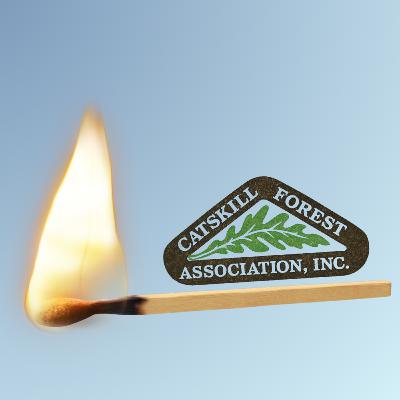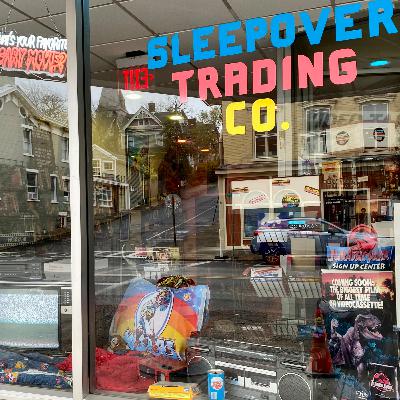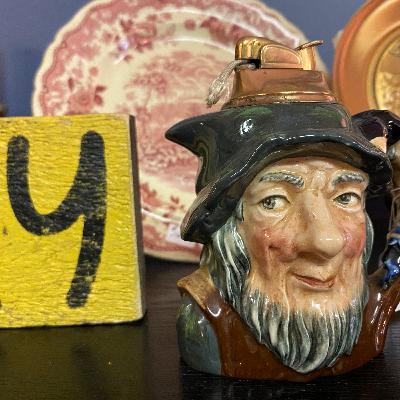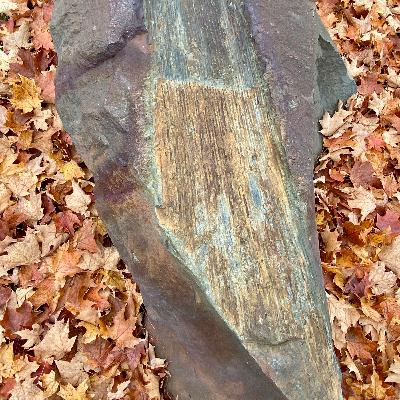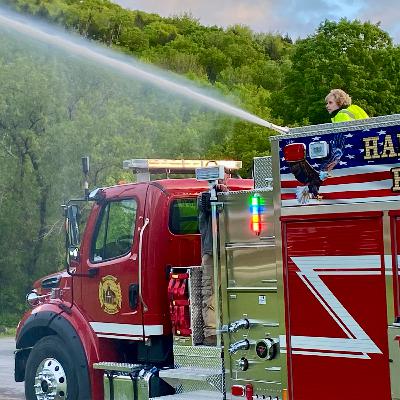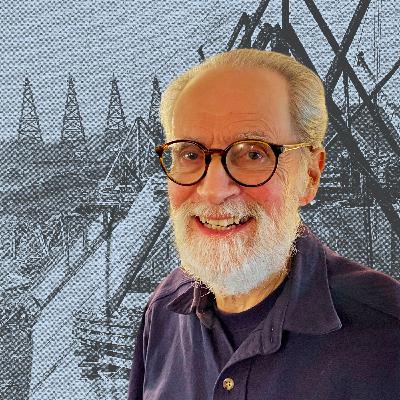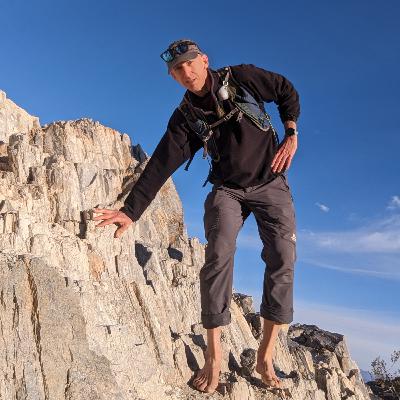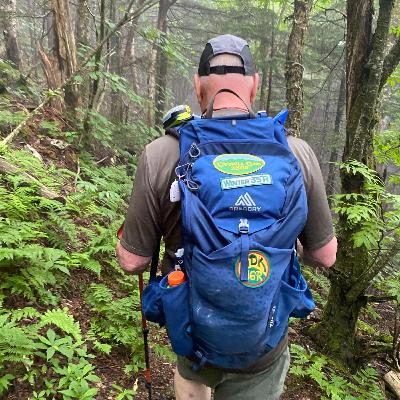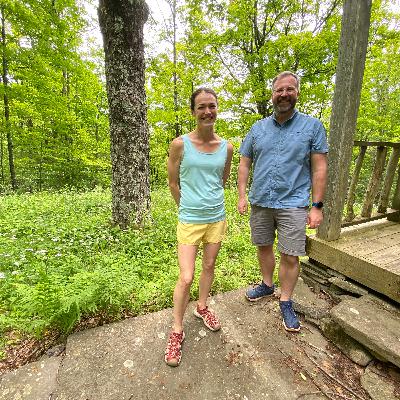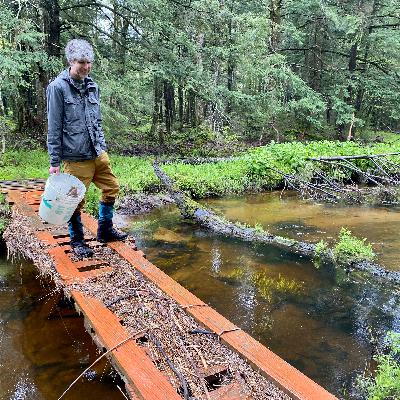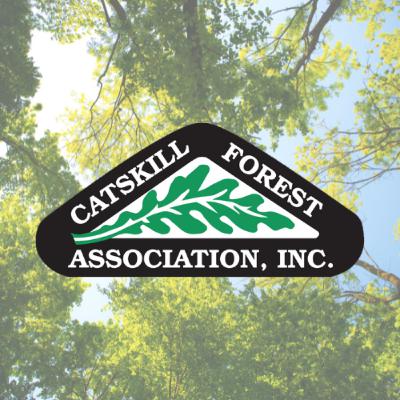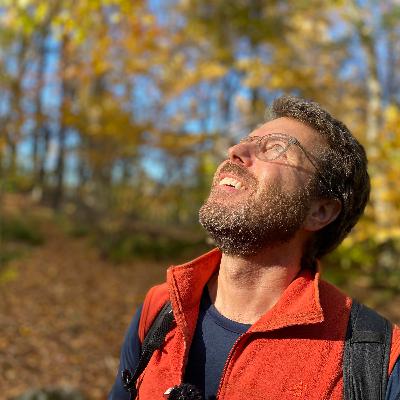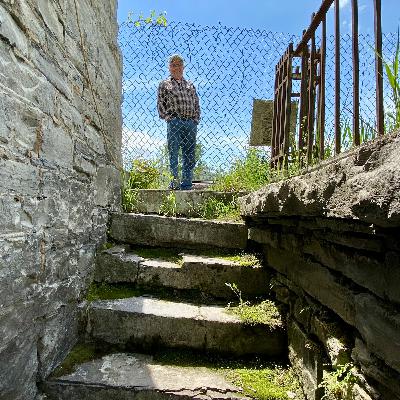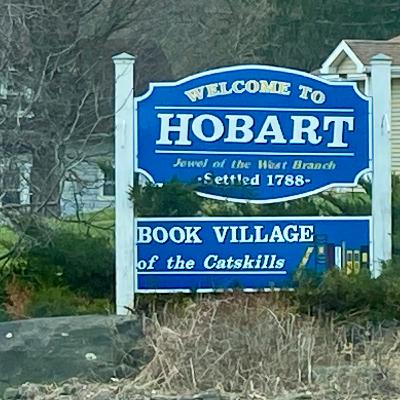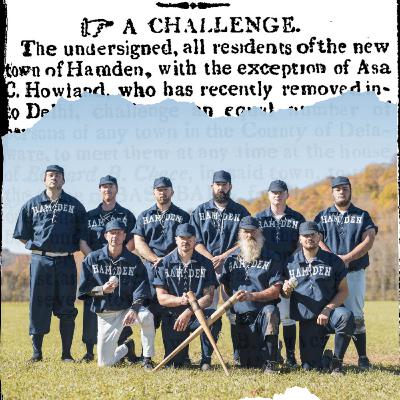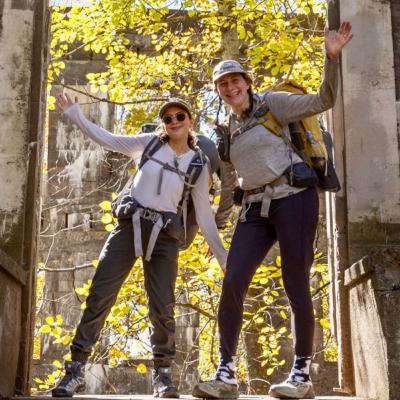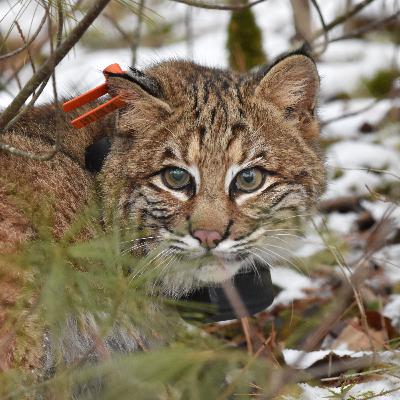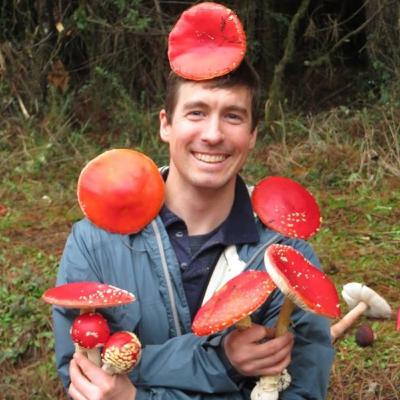Discover Kaatscast: the Catskills Podcast
Kaatscast: the Catskills Podcast

Kaatscast: the Catskills Podcast
Author: Silver Hollow Audio
Subscribed: 23Played: 694Subscribe
Share
© Silver Hollow Audio
Description
Kaatscast: the Catskills Podcast is a biweekly series featuring Catskills culture, history, sustainability, local interviews, literature, and the arts. Shows are hosted by Brett Barry and produced by Silver Hollow Audio, in the heart of the Catskills. Subscribe and experience what reviewers have called “delightfully informative” storytelling with “great production quality.” Voted “Best Regional Podcast” three years in a row. Episode archives, transcripts, and a robust search engine at kaatscast.com. Enjoy!
160 Episodes
Reverse
Prescribed Fire in the Catskills: Restoring a Lost ToolIn this episode, Brett sits down once again with Ryan Trapani, Director of Forest Services at the Catskill Forest Association, to explore the surprising ecological value of prescribed fire in the Northeast. Recorded fireside at the Kaatscast studio, this conversation digs into the science, history, and cultural memory of fire in the Catskills, and why small, carefully managed burns may be key to healthier forests, richer wildlife habitat, and a more resilient landscape.Key TopicsWhy fire disappeared from Northeastern land management — and why that’s a problemHow Indigenous communities shaped ecosystems with fireWhat “pyrogenic species” like oak and chestnut need to thriveThe Catskill Forest Association’s new prescribed burn programHow controlled burns can improve wildlife habitat and biodiversityThe challenges of permits, insurance, and public perceptionWhat early‑successional habitat is — and why we’re losing itLessons from the Albany Pine Bush and Shawangunk RidgeAbout the CFA Prescribed Burn ProgramRyan outlines CFA’s cautious, incremental approach to reintroducing fire on private lands — starting with low‑complexity field burns, building community familiarity, and navigating the regulatory and insurance landscape. The goal: restore a long‑missing tool to the Catskills’ silvicultural toolbox.
In this episode of Kaatscast, Brett visits Sleepover Trading Company in Catskill, New York—a new video rental shop rebuffing the algorithmic grip of streaming platforms by reviving the analog joy of VHS tapes, comic books, and sleepover culture. Owners Rob Ribar and Guido Sanchez share how their passion for collecting movies, comics, and memorabilia evolved into a retro storefront in the historic Catskill Community Theater.Together, they explore the legacy of Video Visions, a beloved Chatham video store whose 20,000‑title collection now lives on at Sleepover Trading. Along the way, they reflect on the lost art of browsing shelves, the freedom of discovery beyond algorithms, and the nostalgia of sleepovers filled with horror flicks, trading cards, and late‑night laughter.Highlights:The VHS revival: Why physical tapes still matter in an era of disappearing streaming titles.Video Visions legacy: Preserving Steve Campbell’s 20,000‑movie collection as a living library.Sleepover culture: Comics, toys, trading cards, and the perfect mix of nostalgia.Analog over algorithms: How human curation fosters true discovery.Community connections: From flea markets to local artists, building Catskill’s movie hub.Lost media preservation: Taped‑off‑TV VHS archives, commercials, and forgotten gems.Membership perks: Rentals without late fees, access to rare titles, and even VCR equipment.Links:Sleepover Trading Company: https://linktr.ee/sleepovertradingcoVideo Visions (documentary): https://youtu.be/6h3VvS5N8g0
In this episode of Kaatscast, host Brett Barry visits Catskill Collectibles, a unique shop in Catskill, NY, curated by Tom Illari. The shop specializes in Catskills memorabilia, blending new creations with rare vintage items going back to the 19th century. Tom shares his journey from a finance career to running the shop and his lifelong passion for the Catskills, highlighted by his extensive personal collection of historical items. Brett and Tom chat about the nuanced relationship between the village of Catskill and the broader Catskills region, the resurgence of the area as a vacation destination, and the evolving interests of collectors and tourists alike. 00:00 Introduction to Catskill Collectibles01:21 Tom Illari's Journey to Catskill03:01 The Origins of Catskill Collectibles04:57 From Personal Collection to Business07:53 Expanding the Shop's Offerings09:03 Showcasing Unique Vintage Items15:38 The Community and Local Collaborations16:56 Tom's Lifelong Connection to the Catskills18:27 The Resurgence of the Catskills19:22 Challenges and Future of Vintage Collecting20:15 Customer Demographics and Shop Dynamics21:46 Reflections and Future Plans22:46 Holiday Shopping and Popular Items23:35 Local Pronunciations and Community Insights24:46 Catskill's Vibrant Main Street26:42 Tom's Favorite Memories and Nature's Draw28:19 How to Visit Catskill Collectibles29:55 Conclusion and Podcast Information
Measuring Snow: Citizen Science in the CatskillsSummary: Winter in the Catskills isn’t just about skiing, sledding, or shoveling. Snowpack plays a critical role in our water resources, local economies, and even global climate regulation. In this episode, Brett Barry speaks with Dr. Marco Tedesco of Columbia University’s Lamont‑Doherty Earth Observatory, about the NASA‑funded X‑Snow Project — a citizen science initiative inviting volunteers to measure, photograph, and collect snow data across the region.Together, they explore how local observations help validate satellite models, improve climate predictions, and build community engagement around environmental stewardship.🎙️ Episode HighlightsSnow as a climate regulator: Why reflective snowpack matters for Earth’s energy balance.Citizen science superheroes: How everyday volunteers contribute to NASA‑funded research.Snowpack vs. snow depth: Understanding SWE (snow water equivalent) and why density matters.Local impacts: Shorter winters, more rain events, and what that means for Catskills tourism, groundwater, and flood risk.Microplastics in snow: Emerging research on contaminants entering our water systems.Community partnerships: The Catskill Center’s role in training and outreach.How to get involved: Simple Tier‑1 measurements with nothing more than a ruler, or level up to advanced lab sampling.📌 Resources & LinksLearn more or volunteer: x‑snow.usResources and supplies: catskillsvisitorcenter.orgFull episode archive: kaatscast.com
Did you know the Catskill region was once tropical—and south of the equator?! In this episode, Brett Barry visits the Gilboa Museum and Juried History Center to explore one of the oldest fossilized forests on Earth. Education Chair Kristen Wyckoff shares her decades-long passion for paleobotany, the story behind Gilboa’s world-famous Devonian tree stumps, and discoveries unearthed during the Schoharie Reservoir construction, dam restoration, and creek bed fossil hunts.From lungfish and sea scorpions to the mysterious “snake tree,” we dig into the prehistoric past of upstate New York and learn how mud, minerals, and mural magic preserve a forest that predates the Catskills themselves.🪨 Highlights🌴 Gilboa’s tropical past—when the region was south of the equator🦴 Fossil discoveries during Schoharie Reservoir construction🎨 Kristen’s murals and museum exhibits📚 A children’s book adventure through the Devonian🐟 Sea creatures, spore trees, and sedimentary surprises🏛️ How a generous hometown alum helped build a fossil-focused museum complex🔗 ResourcesVisit the museum: gilboafossils.orgKristen Wyckoff’s children’s book: Dennis’s Devonian AdventureLearn more: The Catskill Fossil Forest by Stein, Hernick, and Mannolini📍 Broadcast InfoKaatscast is now broadcasting a public radio edition! Saturdays at 11 AM on WJFF Radio Catskill (90.5 FM). Subscribe wherever you get your podcasts and follow us on Instagram @kaatscast.
🎙️ Neighbors on the Front Lines: Margaretville FD and the Spirit of Catskills VolunteerismEpisode Description: In this episode of Kaatscast, we head to Margaretville, New York, where volunteer firefighters train for blitz attacks—a high-volume water technique used to knock down fires fast. But this story goes beyond the hose line. It’s about community, commitment, and declining volunteerism nationwide.With over 90% of New York’s fire departments staffed by volunteers, towns like Margaretville rely on neighbors—teachers, shopkeepers, reporters, and retirees—to respond when disaster strikes. Hear from training officer Jon Schebesta and longtime volunteers like Nate Hendricks, Lissa Harris, and others, as they share personal stories, challenges in recruitment, and the evolving role of fire departments in rural life.From floods to flames, prop windows to real emergencies, this episode honors the people who show up—when the siren sounds in the middle of dinner.Topics Covered:Blitz attack training and deck gun drillsDeclining volunteerism in rural communitiesPersonal stories from Margaretville FD membersEmergency response beyond firefightingRoles for volunteers of all backgroundsFunding and equipment in rural departmentsLocation: Margaretville Fire Department, Catskills, NYListen & Subscribe: Stream anytime at kaatscast.com or wherever you get your podcasts. Follow us on Instagram @kaatscast.Watch the short documentary, Growing Up Catskills, featuring Phoenicia's Gene Gormley: https://vimeo.com/224535275
In 1985, Bob Steuding published The Last of the Handmade Dams: The Story of the Ashokan Reservoir, a historically rich account of the building of the Ashokan Reservoir—and the lives displaced in its wake. Forty years later, the book remains a cornerstone of Catskills regional history and the inaugural title from Purple Mountain Press.In this episode, we visit Bob and Martha Steuding at their 18th-century stone farmhouse near the reservoir. Literary correspondent Rebecca Rego Barry sits down with Bob to reflect on a life rooted in place, the founding of Purple Mountain Press, and the emotional legacy of a dam that reshaped a landscape—and the lives within it.
Ken Posner is an ultrarunner, barefoot hiker, and challenge-seeker whose latest book, Chasing the Grid, chronicles his quest to summit 35 Catskill high peaks in every month—a challenge known as “The Grid.” That’s 420 climbs, through every season, in pursuit of something deeper than endurance.In this episode, Ken shares how the experience became a spiritual journey, shaped by minimalism, transcendentalist thinking, and a deep connection to the land.Available now 📚 Chasing the Grid: An Ultrarunner's Physical and Spiritual Journey in Pursuit of the Ultimate Mountain Challenge⌨️ Barefoot Ken on the web
In this episode, Brett hits the trail with longtime Catskill 3500 Club member (and current president) Michael Bongar for a hike to Southwest Hunter Mountain—one of the club’s required peaks and a rite of passage for aspiring members. Founded in 1962, the Catskill 3500 Club encourages hikers to summit 33 peaks over 3,500 feet—plus four of them again in winter. But it’s more than a checklist. Through trail maintenance, education, and conservation advocacy, the club fosters a deep connection to the Catskills.Michael shares stories from decades of hiking, reflects on the club’s evolution, and—yes—recounts his time as a professional clown, offering a surprisingly poignant parallel between performance and trail camaraderie. From herd paths to canisters, elevation gain to ethics, this episode is a love letter to the mountains and the community that keeps them wild.Catskill 3500 Club: https://www.catskill3500club.orgNew York-New Jersey Trail Conference Trail-A-Thon 2025: http://bit.ly/gotrailathon
🎙 Platte Clove Preserve: A Small Parcel with Big Impact Presented by Kaatscast: The Catskills PodcastHost Brett Barry visits the Platte Clove Preserve with Jeff Senterman and Kali Bird of the Catskill Center to explore the surprising significance of a newly acquired 3.6-acre parcel. Though small in size, this land plays a vital role in preserving wilderness access, ecological integrity, and the scenic character of the Catskills. The episode also reflects on Jeff and Kali’s 10-year journey with the Catskill Center and its evolving role in advocacy, stewardship, and community engagement.🔗 Resources & Mentions • Catskill Center – catskillcenter.org • Hanford Mills Museum – hanfordmills.org • Briars & Brambles Books – briarsandbramblesbooks.com • Mountain Eagle News – mountaineaglenews@gmail.com🎧 Credits Producer/Host: Brett Barry Guests: Jeff Senterman & Kali Bird Transcript: Jerome Kazlauskas Announcements: Campbell Brown Production: Silver Hollow Audio More info: kaatscast.com | Instagram: @kaatscast
Adjacent to the Willowemoc Wild Forest, in the Sullivan Catskills, a 3100-acre parcel once eyed for development is now safeguarded for future generations. In this episode, we chronicle the Open Space Institute’s landmark deal, and potentially the largest acquisition for the Catskills in nearly 25 years.From the quiet negotiations with landowners to the sweeping implications for climate resilience and watershed health, this episode dives deep into what makes Blue Hill so important to the region. Key highlights include:Behind-the-scenes details on how OSI’s team identified and secured the propertyThe role of Blue Hill in protecting coldwater streams critical to downstream communitiesA look back at Blue Hill’s brushes with development, including a ski resort derailed by liquor restrictions What the public can expect in terms of access, trails, and community engagementReflections on regional conservation wins and what they signal for the futureHear from Tom Gravel, OSI's Northeast Project Manager, and Charlie Burgess, OSI’s Northern NY Stewardship Manager about OSI's strategic land acquisitions—and how they are advancing New York’s commitment to conserve 30% of its lands and waters by 2030 under the state’s 30x30 initiative.
How does the botanical elegance of a 19th-century artist find new life in contemporary design?In this episode of Kaatscast: The Catskills Podcast, host Brett Barry follows the enduring influence of Emily Cole—daughter of Hudson River School painter Thomas Cole—whose delicate hand-painted ceramics helped define her artistic legacy. Cole was a founding member of the New York Society of Ceramic Arts in 1892, and she advocated for china painting to be recognized as fine art. Her floral porcelain was “highly prized and much sought after,” admired for its lifelike detail and expressive form.In a special pop-up collaboration, tattoo artist Kelsey Lue brought Cole’s botanical watercolors—on exhibit at the Thomas Cole National Historic Site—into a new medium. Clients at Hummingbird Tattoo were invited to choose from Emily Cole–inspired designs, bridging past and present through artistic interpretation.The exhibit, titled EMILY COLE: Ceramics, Flora & Contemporary Responses, is on view at the Thomas Cole National Historic Site from May 3 to November 2, 2025.Featuring insights from curator Amanda Malmstrom and moments from the tattoo chair, this episode celebrates Emily Cole’s creative spirit and the artists who continue her legacy through reimagined design.Guests:Kelsey Lue – Tattoo artist, Hummingbird TattooAmanda Malmstrom – Associate Curator, Thomas Cole National Historic SiteJaime Pedersen – Tattoo clientLinks:Hummingbird Tattoo: https://www.hummingbirdtattoo.comThomas Cole National Historic Site (Emily Cole exhibit): https://thomascole.orgFollow Kaatscast: Instagram: @kaatscast Newsletter & archives: https://kaatscast.com
Is leaving the woods alone really the best way to preserve them? According to forester Ryan Trapani of the Catskill Forest Association, “doing nothing” comes with hidden costs—and a whole lot of shade-loving trees. In this immersive forest consultation, Ryan pays a visit to host Brett Barry's property to explore hands-on stewardship, the limits of laissez-faire ecology, and the surprising power of sunlight in shaping forest health.In this episode:How to spot hazard trees before they fall (and cost you)Why “doing nothing” might be the worst forest strategyTree-for-tree advice on pruning, spacing, and crop tree managementSunlight as a limiting factor in Catskill forest healthTips for invasive pest management: ash decline & hemlock woolly adelgidCFA’s hands-on services, from mushroom inoculation to apple graftingPlus, hear Ryan’s reflections on 700+ episodes of From the Forest radio—and learn how CFA’s independent, community-driven model helps landowners steward their properties with purpose.More info: 🌿 catskillforest.org 📡 CFA’s radio show: fromtheforest.podbean.comPlease keep in touch at kaatscast.com, rate and review on the podcast app of your choice, and follow us on Instagram.
Sure, you can drive from NYC to the Catskills in just under 3 hours. But as "Doobby," the taxi driver in Planes, Trains and Automobiles says, "You don't see nothing on the interstate but interstate." In this episode, host Brett Barry walks with Casey Kelbaugh on a stretch of the "Long Path," a 358-mile trail from the George Washington Bridge in New York City to the edge of the Adirondack Park. Casey recounts his 27-day hike from East 4th Street in Manhattan to his cabin in the Catskills via the Long Path, an experience he then shared in the travel section of the New York Times. 00:00 Introduction to the Catskills Voyage00:15 Discovering the Long Path00:52 Sponsors and Supporters01:30 Casey's Journey Begins02:18 Hiking the Long Path05:40 Challenges and Reflections13:16 Community and Connections26:02 The Final Stretch29:19 Conclusion and Next Episode Preview
Exploring Howes Cave: History, Tragedy, and TourismHistorian and author Dana Cudmore, a former tour guide and current chronicler of Howes Cave, Howe Caverns, and Schoharie County's "Cave Country," gives us a lay of the land and recalls the oft-repeated question, " Anybody ever die down here?" Cudmore recounts in his 2024 book, The Cave Electrician’s Widow: The Tragedy at Howe Caverns & Dramatic Courtroom Fight for Justice, the story of two Howe Caverns employees who tragically asphyxiated in response to a nearby dynamite blast on April 24, 1930. The conversation describes the events of that tragic day, as well as the continuing allure and industrial significance of the caves and surrounding area. Buy a copy of The Cave Electrician's Widow here, and use code KAATSCAST for 25% off plus free shipping!Enter here for a chance to win a signed copy!00:00 Introduction: The Popular Question00:16 History of Howe Caverns02:04 Touring Cave Country03:18 Lester Howe's Discovery of Howe Caverns06:20 Secret Caverns and Fraternal Rivalries11:17 The 1930 Tragedy21:56 Modern-Day Mining in Howes Cave22:52 Conclusion and Author's Reflections
This episode of Kaatscast features an interview with Don Dales, a key figure in transforming Hobart, New York, into Hobart Book Village. The journey began with a single bookstore in a declining village and expanded into a book lovers' destination with seven bookstores, the Book Village Inn & Bar, and annual events, attracting visitors from far and wide. Dales discusses the initial challenges, community resistance, and the eventual success that turned Hobart into a thriving literary hub in The Catskills' Delaware County.00:00 Introduction to Hobart Book Village00:24 The History of Hobart and Its Bookstores01:58 Interview with Don Dales06:21 The Decline and Revival of Hobart10:18 The Book Village Concept Takes Shape17:19 The Impact of Media and Future Prospects23:25 Conclusion and Final Thoughts
In this episode, Captain Drewski of the Delhi Polecats, formerly known as the Delhi Vintage Baseball Club, joins us to discuss the revival of vintage baseball in Delaware County, New York. Drewski shares the historical significance of a 200-year-old baseball challenge documented in an 1825 edition of the Delaware Gazette, marking the earliest recorded organized game of baseball in the United States. The Hamden 9, as part of the town's bicentennial celebrations, continue the tradition of playing baseball by 1800s rules using period-accurate attire and equipment. For more on Hamden, NY's bicentennial celebration, head over to hamden1825.org. Tune in to learn more about the history, teams, and events that honor this unique variation of America's pastime; plus, an investigation into the claim that a Catskills paper was the very first to put a baseball game in print!For even more, check out an episode we produced in 2021 with the M.A.C.'s Collin "Stumpy" Miller during spring practice on Creamery Field in Bovina, NY. 00:00 Introduction to Vintage Baseball in Delaware County01:00 Meet the Hamden 9: A New Vintage Baseball Team01:32 The Historical Significance of 1825 in Hamden02:03 Sponsorship and Support for Vintage Baseball02:40 Formation and Growth of the Delhi Polecats06:10 The Unique Charm of Vintage Baseball06:51 Debating the Origins of Baseball07:57 The 1825 Baseball Challenge in Hamden09:12 Celebrating Hamden's Bicentennial13:24 The Rise of Vintage Baseball in the Catskills18:22 Upcoming Events and Invitations19:14 Listener Feedback and Conclusion
This episode explores an overnight camping trip led by Melissa Goodwin, a licensed guide and founder of 'Girl Gotta Hike,' aimed at encouraging women to connect with the outdoors. Olivia Sippel, our production intern, shares her first camping experience in the Catskills, guided by Melissa, also known by her trail name 'Click.' The story delves into how Melissa's passion for hiking evolved, and the creation of her hiking service, with a focus on women and accessibility. The episode highlights their journey, history and insights from the Appalachian Trail, and the impact of outdoor adventures on personal growth.00:00 Introduction to Public Transit Hiking00:44 Olivia's First Camping Experience01:23 Melissa's Trail Name and Appalachian Trail Journey04:38 Signing In and Exploring the Trail07:56 Trail Lunch and Devil's Path10:53 The Birth of Girl Gotta Hike24:36 Conclusion and ReflectionsFor stories about trailblazing women of the 19th century, check out Purple Mountain Press's new edition of Breaking Trail: Remarkable Women of the Adirondacks. Enter code KAATSCAST for 25% off + free shipping through 5/31/2025.
Kaatscast spoke with Cornell University researchers about their latest investigations into New York State bobcat population abundance and the discovery of avian influenza (bird flu) in these wild felines. Featuring Jenny Bloodgood, a wildlife veterinarian, and Haley Turner, a Cornell graduate student, the podcast explores their collaborative efforts to assess bobcat abundance and health using GPS collar tagging and camera trap stations. The discussion highlights various diseases affecting bobcats, including avian influenza, which has been detected in several sampled animals. The conversation also touches on historical challenges faced by bobcats, conservation efforts, and the implications of their findings for wildlife management.---00:00 Introduction to Bobcat Research01:41 Meet the Researchers04:35 Bobcat Population History05:41 Research Methods and Findings12:43 Health and Disease in Bobcats17:09 Impact of Avian Influenza29:30 Human Influence and Conservation37:21 Conclusion and Future Research---Cover photo courtesy of Joshua Twining
Exploring the Magical World of Mushrooms with Catskill Fungi's John MichelottiIn this episode of Kaatscast, host Brett Barry interviews John Michelotti, mushroom maven and founder of Catskill Fungi. John draws listeners into the enchanting and complex world of fungi, sharing his journey from an outdoor guide to becoming an enthusiastic mycology educator. Recorded at Catskill Fungi's commercial kitchen in Pine Hill, the episode delves into the life cycle of mushrooms, their ecological roles, cultivation methods, and the mysteries of mycelium. John discusses the various types of mushrooms found in the Catskills, including edible, poisonous, and even mind-altering varieties. The episode also highlights the health benefits of mushroom extracts from varieties like Reishi, Lion's Mane, and Chaga. John is one one of the Catskill Center's "50 Stewards of the Catskills." Oh, and he's a super "fun-guy." Mwah-ha-ha!00:00 Introduction to Seasonal Mushrooms00:26 Meet John Michelotti: The Mushroom Maven01:37 The Journey to Mushroom Mastery05:55 Understanding Fungi and Mycelium08:43 The Ecological Role of Fungi16:51 Mushroom Cultivation Techniques18:58 Edible and Toxic Mushrooms23:57 Mushroom Identification and Walks24:41 Mushroom Foraging Adventures25:17 Fungi Cultivation Workshops25:57 Diversity of Edible Mushrooms26:19 Mushroom Production in the US27:36 Identifying Edible and Poisonous Mushrooms29:14 Psychedelic Mushrooms in the Catskills32:03 Processing Mushrooms into Extracts38:26 Health Benefits of Mushroom Extracts44:23 Conclusion and Contact Information


